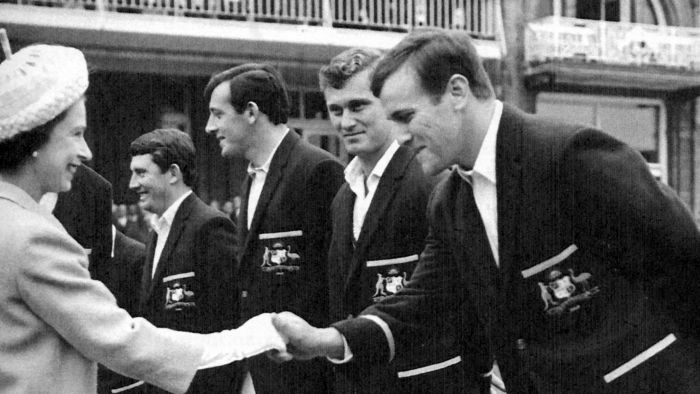Tributes are pouring in for former test cricketer and champion SANFL forward Eric Freeman, who has died aged 76.
Key points:
- Eric Freeman played cricket for Australia and South Australia
- He also played for Port Adelaide in the SANFL
- He died on Monday
He had a heart attack last weekend and was taken to the Queen Elizabeth Hospital, but died on Monday night.
Freeman was born in Semaphore, Adelaide, and went on to play 11 Tests for Australia and 83 for South Australia from 1964-1974.
In the winter, he turned his attention to football, playing 116 games for Port Adelaide, kicking 390 goals.
Ken “KG” Cunningham umpired him in many SANFL games and was also one of his cricket teammates in the Australia and South Australia teams.
He said Freeman should have played more Tests for Australia and vividly recalled his role in bowling South Australia to the Sheffield Shield title in the last match of the 1970-71 season against a strong NSW side.
Cunningham recalled Freeman taking five wickets in the first innings before disaster struck.
“I was fielding at mid-on in the second innings, going for the outright, and he said, ‘KG, I’ve just tweaked the hammy,'” he said.
“I said, ‘Well, you certainly can’t go off now, Fritzy, we need you badly.’ And he did that and knocked them over.”
In fact, Freeman captured an amazing 8/64 as the Blues were bowled out for 193.
Freeman an all-rounder with a lasting legacy
Cricket Australia (CA) also paid tribute to Freeman, who made his debut against India at the Gabba in 1968, removing both opening batsmen with his right arm, fast-medium bowling.
He went on to take 13 wickets at an average of 30.07 and scored two half-centuries with the bat at an average of 30.50.
CA chairman Earl Eddings said Freeman’s legacy would long be remembered.
“He was an all-rounder in every sense of the word — powerful with both bat and ball in cricket and a prodigious goalkicker with the Magpies in the winter months.”
“Fritzy” played with Port Adelaide from 1964 to 1971, led the goalkicking for five years, and played in the 1965 premiership.
His honours included winning the Ken Farmer Medal in 1966 after kicking 81 goals and playing for South Australia as well.
A clubman who contributed after his sporting career
Magpies champion Russell Ebert, who played alongside him for four years, described Freeman as the ultimate clubman.
Loading
“He played mostly at full-forward and he would say, ‘Just get the ball to me,’ and he invariably did something with it,” Ebert said.
“He was a beautiful kicker and such a strong competitor who never, ever wanted to be beaten.”
Cunningham had a close view of Freeman’s football career, which included him once kicking 14 goals against Woodville in 1970.
“I umpired him many times and, goodness gracious me, some of those uncanny marks that he took and the long goals he kicked, I could go on and on,” he said.
The paceman was also something of a larrikin, with a particular liking for parts of sandwiches served up at lunchtime cricket breaks.
“In the change rooms, the room stewards would bring a big plate of sandwiches for the players,” Cunningham reminisced.
Freeman also endured personal heartache during his life.
“We lost our son to suicide and we had to pick up the strings from there,” he once told ABC News.
His son David was 29 and one of Adelaide’s top greenkeepers when he took his life in 1999.
Further tragedy followed five years later when Freeman’s 19-year-old grandson, Matthew Kakoschke, a promising cricketer, died from illness.
But Freeman always fought back and spent many years training junior cricketers at West Torrens.
When he retired, Freeman went on to establish a long and successful career as a sports commentator with ABC Radio.







